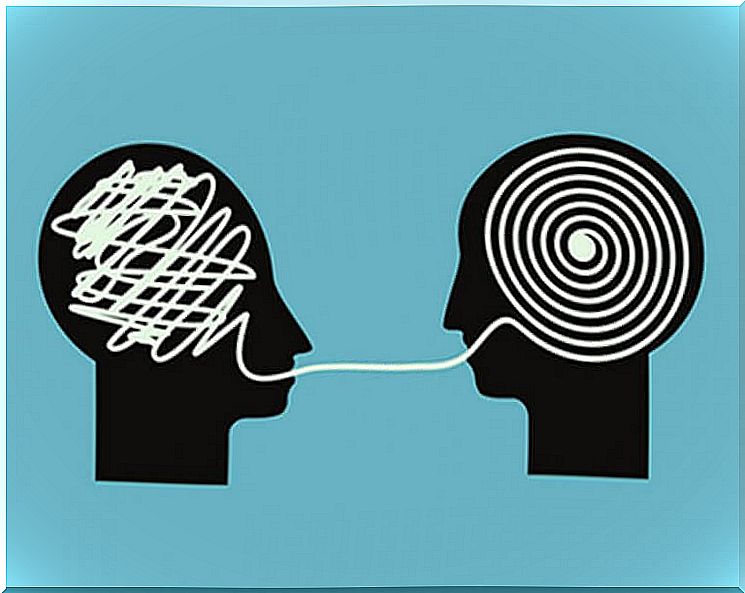7 Techniques For Managing Your Emotions

Learning techniques for dealing with your emotions means that you calmly and creatively channel today’s stress. Although emotions are a part of life, we should not forget that we need to know how to regulate them. In fact, this is the key to having a better life, full of opportunities.
Neuropsychologists say that we have an average of 6,000 thoughts per day. Of these, 95% are the same as the day before. Learning to think differently and change one’s attitude towards certain people, ideas, situations or objects is not easy, we know that. The reason for this is that no one enters this world knowing what emotions are and how to control them.
We all come into this life crying. It will be our only language until someone says “enough”. Someone will tell us that “crying is not something for big kids”. And that’s what we do. We let the years go by in this way, and hold back our anger because they have told us that we should not express it in this way. But they never tell us how we should do it.
For heroes do not get angry or scared. So they are not role models for young children and slightly older children. Where can they see a good example of how to deal with their emotions?
James Gross, at Stanford’s Psychophysiological Laboratory, explains it better. He says you need to know how to use good techniques to deal with your emotions. This is the key to counteracting diseases such as depression or borderline personality disorder. So by dealing with our negative thoughts, we will also deal with our well-being.

There are many techniques to deal with your emotions. But before we start doing research and exposing ourselves to the risk of being overwhelmed by the dynamics and proposals that the world offers us, we must have one thing clear to us.
There is no way to deal with emotions that are good for everyone. We all have to sit down with our own personal toolbox. Not every tool that has worked for others will work for us and vice versa.
For example, it is common for many people to start with mindfulness – conscious presence. They hope that this will solve the puzzle of life, but not everyone learns to meditate. Not everyone finds a physiological and mental peace in this.
The most recommended is to use a multidimensional focus ; one where the cognitive, physiological and emotional part points towards a common goal. That goal is well-being, peace and better mental focus.
We will now look at seven techniques for dealing with your emotions that have been shown to be effective. We recommend that you try all of them and stick to the ones that work best.
Of course, we cannot control everything that happens in our daily lives, but there are situations that we can actually control. We can avoid them to improve our well-being.
- Leaving home in the morning to arrive on time means that I rush. This makes me in a bad mood. So I should try to get up earlier so as not to rush.
- It can feel awkward with family dinners on Sundays. In this case, it is best to suggest other options. That way, you will avoid the situation to improve your health.
- There are also things and situations that I can not get out of. For example, I could avoid giving presentations at work or taking the flight, but all that will only make the anxiety grow even more. Sometimes we have to face our fears in order to overcome them.

My employee gets more contracts than I get. My neighbor managed to lose weight before me. This train is going too fast, we will surely crash, there is only bad news in the newspaper, something bad will probably happen…
All this does is stress us out. This feeds our fears, lowers our self-esteem and causes us to lose control in life. We must learn how to shift our gaze away from the complex environment around us. That way we can direct it inwards, towards ourselves.
When we spend time there within ourselves, take care of ourselves and listen to ourselves, everything will regain its balance. This is one of the best techniques to deal with your emotions.
We know the concept of directing our attention to what is here and now. However, we will suggest something different. Think about the near future. Think of tomorrow or the coming week.
- Sometimes the present is completely occupied by fears, stress and frustration.
- Instead, think of these as actions that you must take on a regular basis. “I want to feel good, I want to achieve this, I want this to happen and I want to feel more confident.”
- Remember your strengths and what you have achieved before, you will find more motivation in the present.
Nietzsche once said: thoughts come when they want, not when we want them to come. The same goes for what we worry about. They are like crows hacking at power lines because they are afraid and have anxiety. They are there to make them worse, to turn off your optimism and potential and leave you in the dark.
Do not let them do this. Every time the anxiety shows up, turn it off. Leave it for another time when you are calm and relaxed. Then you can reflect on it and try to find solutions to the problem.

It happens to all of us. Sometimes we get obsessed with things and hit our heads against the wall without finding a way out.
These are thoughts like “they will fire me”, “my boyfriend is not listening to me anymore”, “I will not have enough to pay off that debt…” They are trapping us in a meaningless labyrinth, an exhausting spiral.
Instead of nurturing these thoughts, we should learn how to go further. Let us ask ourselves what can happen if what we are afraid of happened. But let’s do it right, with a solution:
- “If they fire me, I might eventually choose to do that project.”
- “If my boyfriend does not listen to me, I will ask him what is wrong. If the relationship then no longer works, I have to accept this, deal with the pain and move forward. ”
- “If I can not pay off my debt, I have to sell some things or ask my family for help.”
Meditation is one of the most effective techniques for managing your emotions. But for this strategy to succeed, we need to practice it often. We will not see results in the first week and maybe not even the first month. But if we practice it regularly, it will definitely show results. The key to achieving results is to be patient and consistent.
Meditation is effective for many things. It can help you deal with thoughts, reduce stress, improve your attention span and help deal with daily anxiety.
There are people who find refuge and self-expression by writing. You may be drawing or painting mandalas to deal with your emotions. Some people may be running, some need silence or being in nature. Then there are people who do better by having a coffee with friends, reading books, listening to music, going out with the dog or spending some time to themselves.
The best techniques for managing your thoughts do not always come from books. Sometimes we find them ourselves. It is often when we least expect it that we find that activity that helps us find peace.
It is a space where we can get to know ourselves again and find the root of our problems. It is a refuge where we find peace and where our courage finds a home.

So let’s find a way to express ourselves and feel better about ourselves. Let’s devote quality time to this and apply some of the techniques here to improve our health. Every effort to manage your emotions will be worth it.
References
Gross, JJ (2001). Emotion regulation in adulthood: Timing is everything. Current Directions in Psychological Science, 10, 214-219. DOI: 10.1111 / 1467-8721.00152.
Gross, JJ, & Jazaieri, H. (2014). Emotion, emotion regulation, and psychopathology: An affective science perspective. Clinical Psychological Science.
Goleman, Daniel (1995). Emotional Intelligence. Bantam Books.
Bradberry, Travis. Greaves, Jean (2009). Emotional Intelligence 2.0. Talent Smart.
R.Covey Stephen (1988). The 7 Habits of Highly Effective People. Free Press.








